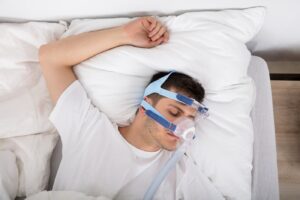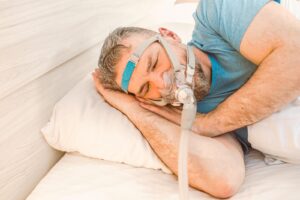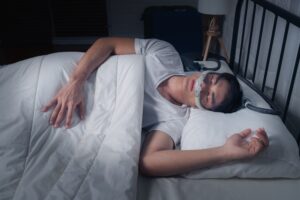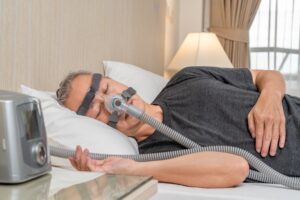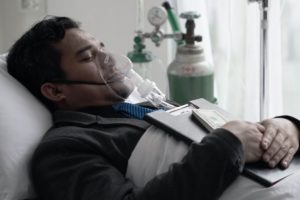If I Snore Do I Need CPAP?
- Snoring is common and caused by relaxed throat tissues vibrating during breathing.
- CPAP is primarily used for sleep apnea and may reduce snoring in those cases.
- Explore alternative solutions and consult a healthcare professional for guidance on the most suitable treatment.
- If you’re concerned your sleep problems are due to sleep apnea, a home sleep test can be a helpful first step in the right direction.
Most people who snore do not need to use a CPAP machine. Although CPAP devices can typically resolve snoring, they are usually only recommended for people with sleep apnea.
For some people, snoring is a symptom of sleep apnea, which can cause daytime sleepiness and other health problems as a result of repeated pauses in breathing during sleep. However, the majority of people who snore do not have sleep apnea, and these individuals can generally reduce snoring with treatments other than CPAP therapy.
Suspect You May Have Sleep Apnea?
Answer three questions to understand if you should be concerned.
Can You Snore and Not Have Sleep Apnea?
Snoring is one of the main symptoms of obstructive sleep apnea (OSA), but it is common for people to snore without having sleep apnea. Almost all people snore from time to time, and even frequent snorers often do not have sleep apnea.
It is estimated that, among middle-aged adults, as many as 44 percent of males and 28 percent of females snore regularly. However, studies have found that less than one-third of these snorers have OSA.
Sleep apnea is a disorder that occurs when breathing periodically stops or slows during sleep. In OSA, the cause of breathing disruptions is a blockage or obstruction of the upper airway.
While most people who have OSA snore, the fact that someone snores does not mean that they have OSA. The causes of snoring can be linked to a number of issues other than sleep apnea, such as taking certain medications, being overweight, or having congestion or nasal polyps that affect airflow during sleep.
Is it Snoring or Sleep Apnea?
It is important to differentiate someone with sleep apnea from someone who just habitually snores. Snoring that is very loud or that sounds like gasping or choking may be more likely to be linked to OSA. However, symptoms alone cannot determine whether snoring is related to sleep apnea.
Anyone concerned about snoring should talk with a doctor since a medical assessment is necessary to diagnose or rule out OSA. It is especially important to see a doctor if snoring is accompanied by other signs of sleep apnea like:
- Periods of gasping, snorting, or not breathing while sleeping
- Excessive sleepiness during the day
- Feeling unrefreshed even after a full night of sleep
- Obesity
- High blood pressure
- Frequent morning headaches
If a doctor believes that a person may have OSA, they can suggest a sleep study, which is the only way to conclusively diagnose sleep apnea.
Does a CPAP Machine Stop Snoring?
Using a CPAP machine is one of the most effective treatments for obstructive sleep apnea and can stop snoring associated with OSA. CPAP machines generate pressurized air that is carried by a tube to a mask on a person’s face. The steady flow of air holds the airway open during sleep to prevent breathing disruptions.
A CPAP machine may improve breathing right away, and this often includes a major decrease in snoring. However, doctors rarely prescribe CPAP to people who snore but do not have sleep apnea. Most insurance providers require a sleep apnea diagnosis before covering the cost of the machine.
In order for a CPAP machine to treat sleep apnea and reduce snoring, it must be used regularly during sleep. For some people, discomfort while using a CPAP can make it challenging to use the device every night.
“Habitual snoring is common, but never good. It’s best to get a formal evaluation for sleep apnea. Effective treatments exist and may be tailored to the individuals needs.”
Dr. Abhinav Singh, Sleep Physician
Alternatives to CPAP for Snoring
CPAP is rarely prescribed for snoring in people who do not have sleep apnea, but there are other options that can help these individuals reduce snoring. In many cases, these approaches can decrease snoring and the frustrations it can cause for a bed partner.
Lifestyle Changes
There are some lIfestyle changes that people can try on their own at home that may lessen snoring.
- Weight loss: Extra fat around the neck and upper airway can contribute to snoring, so losing weight may reduce snoring. The impacts of weight loss on snoring are not consistent, which means that losing weight will not benefit everyone or necessarily lead to a complete elimination of snoring.
- Quitting smoking: Studies have found a correlation between smoking and snoring, and this may be tied to smoking-related congestion or the body’s withdrawal from nicotine during sleep. Experts recommend quitting smoking as a way to decrease the likelihood of snoring while also improving overall health.
- Avoiding alcohol at night: Consuming alcohol can lead to relaxation of the muscles around the airway, which makes it easier for those muscles to obstruct airflow in a way that causes snoring. It may help to avoid alcohol for at least a few hours before going to bed.
- Mouth exercises: Certain types of mouth exercises can increase muscle tone in the tissues around the airway, and this may cut down on muscle slackening that can play a role in snoring.
Changing Sleep Position
Changing sleep position may also help to reduce snoring. Side sleeping is the best position to minimize snoring.
For some people, it may be difficult to switch to a side-sleeping position. A range of products are marketed to help people stay on their side throughout the night. These include posture pillows and posture alarms. Special sleep shirts are also available that have a small ball attached to the back that makes back sleeping uncomfortable.
People who cannot avoid sleeping on their back may try sleeping with their head and upper body elevated. The upper body can be raised by using an adjustable bed, putting blocks under the legs of the upper part of the bed, or using a large wedge pillow.
Medications
If the cause of the snoring is nasal congestion, then over-the-counter drugs and nasal strips may help.
Decongestants and nasal steroid sprays are two options that may reduce congestion, but individuals should always consult with a doctor or pharmacist before using them for any extended period of time.
Another option is using nasal strips , which can be placed on the nose to help widen the nasal passageways and facilitate easier breathing.
Oral Appliances
If other treatments for snoring are not effective, oral appliances may be an option. These devices are custom-made by a dentist and can help alleviate snoring. Oral appliances work by holding the mouth, tongue, or jaw in a specific position that does not block the airway.
A mandibular advancement device (MAD) is a common type of oral appliance . MADs hold the jaw and tongue forward. Another oral appliance is a tongue-retaining device, which is designed to position the tongue further forward in the mouth.
While most people do not have side effects from using oral appliances, the devices can lead to an overbite or other permanent changes to the mouth. People who use oral appliances should only use custom-fitted devices and should have regular checkups with their dentist.
Surgery
Surgery can be a treatment option for snoring if other therapies are ineffective. Some surgical procedures are intended to work by removing or adjusting the shape of oral structures such as the soft palate, tonsils, or uvula. More research is needed to understand the long-term benefits and risks of surgery to address snoring.

Still have questions? Ask our community!
Join our Sleep Care Community — a trusted hub of product specialists, sleep health professionals, and people just like you. Whether you’re searching for the perfect mattress or need expert sleep advice, we’ve got you covered. Get personalized guidance from the experts who know sleep best.
References
5 Sources
-
Rowley, J. A. (2023, January 6). Snoring in adults. In M. S. Badr (Ed.). UpToDate., Retrieved April 2, 2023, from
https://www.uptodate.com/contents/snoring-in-adults -
Schwab, R. J. (2022, May). Snoring. Merck Manual Consumer Version., Retrieved April 2, 2023, from
https://www.merckmanuals.com/home/brain,-spinal-cord,-and-nerve-disorders/sleep-disorders/snoring -
Strohl, K. P. (2021, July 8). Patient education: Sleep apnea in adults (Beyond the basics). In N. Collop (Ed.). UpToDate., Retrieved April 2, 2023, from
https://www.uptodate.com/contents/sleep-apnea-in-adults-beyond-the-basics -
A.D.A.M. Medical Encyclopedia. (2021, July 19). Snoring – adults. MedlinePlus., Retrieved April 2, 2023, from
https://medlineplus.gov/ency/patientinstructions/000720.htm -
Cistulli, P. A. (2023, March 14). Oral appliances in the treatment of obstructive sleep apnea in adults. In N. Collop (Ed.). UpToDate., Retrieved April 2, 2023, from
https://www.uptodate.com/contents/oral-appliances-in-the-treatment-of-obstructive-sleep-apnea-in-adults


